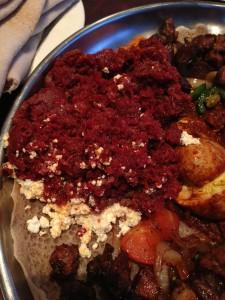
One of the spreads served at Dukem Ethiopian Restaurant.
For me, the quest of restaurant exploration has become a journey of discovery — one of exotic cuisine types, unique usage of herbs, and previously unknown flavors. Being a foodie is a blessing, for it has cultivated in me a curiosity that emboldens me to step outside my comfort zone and garner new experiences.
I pride myself on having tried a lot of cuisines. Nevertheless, there was one piece of the world whose food I had yet to try: Africa. I am very much aware that I have generalized African cuisine into one. I have no doubt that each country, or better yet, each region within any given African country has its own cuisine type. However, prior to my arrival in the United States, I had so little knowledge of the cuisine in this continent that I simply categorized it as one big whole.
As I am writing these words, my understanding of African food is still very scarce, yet I am glad that it is no longer blank. Indeed, a dinner at Dukem Ethiopian Restaurant familiarized me, if just by a little, with this exotic cuisine. The famed Dukem Restaurant is located in U Street, in a neighborhood buzzing with Ethiopian culture. Strolling down the streets, one can easily spot one Ethiopian restaurant after another. Not unlike most dining spots close by, Dukem has a featureless, if not shabby, outer decoration. However, once inside, I was surprised by the warm atmosphere — created not only by the color tone of the inner decor, but also by the vibrant conversation of the customers, the majority of whom were Ethiopians.
The food was spectacular, and, judging by the customer body, authentic as well. Given my lack of knowledge in Ethiopian food, the task of ordering was left to my friend, who had been brought to the restaurant by another friend of his. To this day, I do not know the exact name of the items we had for that dinner — I am quite certain that one order wasn’t even listed on the written menu. On the one hand, I was anxious to try something wholly new to myself, yet on the other, I was nervous about not knowing what I would be trying.
As I wrapped the injera — the spongy bread used instead of utensils — around the meat spread and took my first bite of Ethiopian food, I knew instantly that I had become a fan. Extremely plain looking on one side, the injera surprised me with the beehive-like texture on the other side. Not only did it have excellent texture, the dough itself tasted a bit savory and complemented the spreads perfectly.
We ordered four dishes, or spreads, as I prefer to describe them. Ethiopian cuisine is meant for a group of friends to enjoy together. We focused on the meat options for that dinner. I was blown away by the richness of the homemade cheese, which coupled impeccably with what seemed like mashed beef. The chicken was equally tasty: the sauce was heavenly, and the meat itself was tender. Nonetheless, the star of the whole meal was unquestionably the beef cooked with onion. Even after I felt stuffed, I kept tearing pieces of injera to wrap around the beef, ignoring the other unfinished spreads and the possibility of a food coma.
Until now, I still lament the fact that I only encountered Ethiopian cuisine after 19 years of my life. It’s an even bigger shame that however much I have tried, I have not spotted any Ethiopian restaurant in Shanghai — a pity, because both the taste of the sauces and some of the methods of cooking of Ethiopian dishes resemble those of Chinese cuisine, implying a potential market for this exotic cuisine not merely in D.C., but also my hometown.
Yiwen Hu is a rising sophomore in the School of Foreign Service. This is the final appearance of Tastes of the District.


